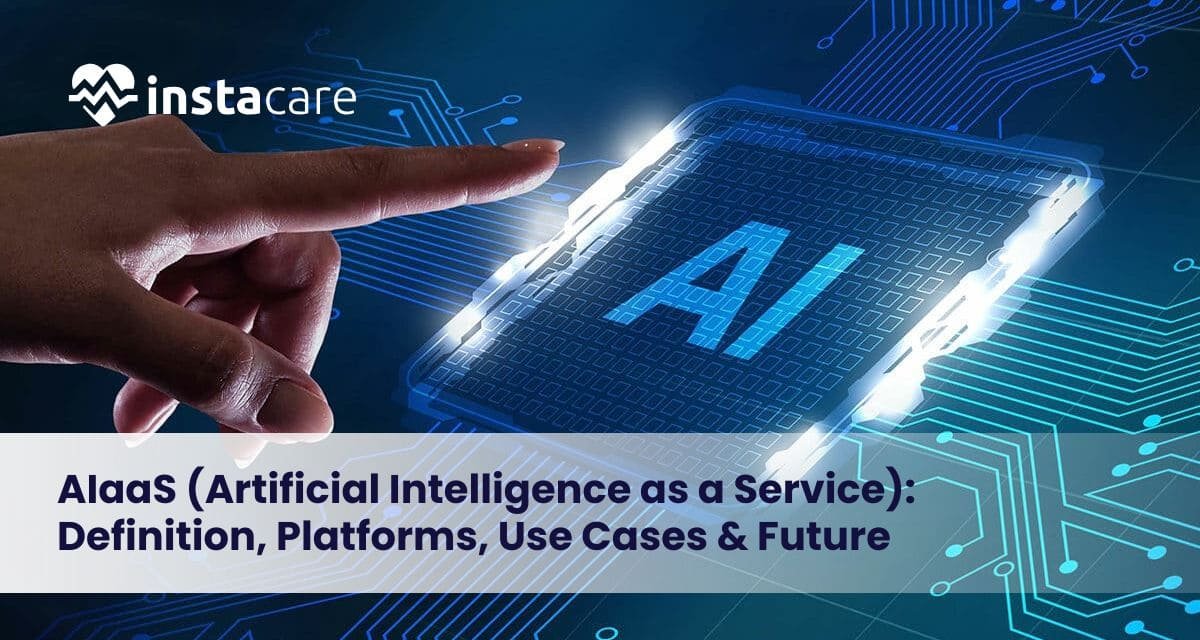Last updated on Tuesday, 9, September, 2025
Table of Contents
AIaaS (Artificial Intelligence as a Service): Definition, Platforms, Use Cases & Future
Artificial Intelligence as a Service (AIaaS) is transforming the way businesses are embracing digital transformation. Cloud enablement of artificial intelligence functionality allows organizations to access powerful tools without establishing costly facilities internally. Ease has been one of the greatest drivers of global adoption, providing innovation, automation, and scalability to any business firm size.
With AIaaS vendors, businesses now employ machine learning, natural language processing, data analytics, and computer vision without or with little initial capital expenditures. The explosive increase in the AIaaS market size only reflects how precious such services have become to industries such as finance, healthcare, retail, manufacturing, and technology.
What is AIaaS?
AIaaS refers to the artificial intelligence capability that is provided by the cloud. Instead of using massive AI teams or building custom infrastructure, AIaaS companies can subscribe to the services of AI offered by large cloud AIaaS providers. They range from simple chatbots to advanced predictive analytics and deep learning models.
Key benefits are cost efficiencies, lower time to implement, and easy access to AI innovation. Organizations can select AIaaS pricing models like pay-per-use, month-to-month subscription, or company-wide contracts based on size and needs.
AIaaS vendors offer plug-and-play AI offerings, making intelligence available to everyone from startups to multinationals, driving high growth rates of AIaaS across the world.
Central Building Blocks of AIaaS
AIaaS is not a product or product suite but a collection of services to meet different business needs. The most crucial ones are usually:
1. Machine Learning (ML) Services
Machine learning allows computers to make predictions and recognize patterns from data. With AIaaS, businesses can utilize pre-trained models to detect fraud, forecast churn, or predict demand. AIaaS ML capabilities can be deployed today compared to resource- and time-consuming traditional development.
2. Natural Language Processing
NLP enables computers to read, comprehend, and produce natural language. NLP technologies are being utilized by AIaaS in business to introduce chatbots, voice assistants, and machine-learning-based translation software. Call centers use NLP to offer enhanced customer service via the real-time analysis of conversations.
3. Computer Vision
Computer vision services read and interpret visual data. Businesses apply them to intelligent inventory management, and hospitals to diagnostic imaging. AIaaS makes them available to everyone, even where there is no native support of AI.
4. Data Analytics & Predictive Insights
Today’s AIaaS in business is facing massive amounts of data. AIaaS providers use platforms to process them in an efficient manner, find the patterns lying beneath, and forecast things that will yet occur. Whether risk modeling of finances, supply chain management, or predictive analytics makes better-informed decisions.
5. Robotics & Process Automation
AIaaS enables workflows to be automated through the replacement of repetitive human steps by AI-driven bots. It simplifies operations while concentrating human labor on more valuable tasks.
These, together, are transforming AIaaS platforms into the panacea that can be utilized by nearly any business.
Popular AIaaS Platforms
Leveraging the utilization of AIaaS first are large cloud vendors with highly elastic and scalable AI offerings. Popular AIaaS platforms are:
- Amazon Web Services (AWS AI Services): Offers Amazon Rekognition (video and image analysis), Lex (voice interface), and Polly (text-to-speech synthesis). AWS enables enterprise-level reliability and scalability.
- Google Cloud AI: Provides AutoML for creating proprietary models, Vision AI, and Natural Language APIs. Google AIaaS is primarily utilized for research and development.
- Microsoft Azure AI: Has Azure Machine Learning, Bot Services, and Cognitive Services. Utilized primarily by organizations for effortless integration with Microsoft’s platform.
- IBM Watson: Famous for NLP, Watson leads AIaaS that has extensive AIaaS in healthcare and business analytics.
- Oracle AI Services: Offers AI-driven automation and predictive analytics, ideally suited for enterprise data-driven organizations.
Niche specialist start-ups are preceded by AIaaS market size and new-age AIaaS solution start-ups.
Applications of AIaaS
AIaaS uses are numerous and growing day by day. Some of the most common ones are:
- Customer Experience: AI chatbots and recommendation engines are used by shopping and service enterprises to make customer interactions personalized.
- Finance: AI is utilized by banks for fraud detection, credit risk assessment, and customer analysis.
- Healthcare: Hospitals employ AI diagnostics in radiology, prognosis-driven health monitoring, and drug development. Expansion in healthcare AIaaS shows the requirement in the sector for timely, accurate processing of data.
- Manufacturing: Predictive maintenance reduces downtime with predictions of equipment malfunction before occurrence.
- E-commerce: Websites rely on AI for enabling targeted purchasing, price optimization, and supply management.
- Marketing & Sales: Businesses utilize AI to make better customer decisions, improve targeting, and gain greater ad spend control.
Real-world applications of AIaaS are the recommendation algorithm used by Netflix, banks utilizing AI anti-fraud solutions, and hospitals utilizing computer vision for disease diagnosis.
Book Your Free Marketing Consultation
Benefits of AIaaS to Organizations
The AIaaS use cases are operational and strategic:
- Cost Savings: Free up companies from the expense of expensive AI infrastructure.
- Rapid Deployment: Organizations deploy pre-trained models within days rather than months.
- Accessibility: AIaaS is opened up to new startups and small and medium businesses.
- Scalability: The services are scalable without much effort as usage and data scale up.
- Continuous Innovation: Providers update models with new AI techniques.
By becoming part of the work process, business AIaaS offers a competitive advantage, superior decision-making, and innovation.
Challenges & Considerations
Deployment of AIaaS is difficult:
- Data Privacy & Security: Information stored on third-party hardware needs to adhere to serious regulatory requirements like GDPR and HIPAA.
- Customization Constraints: Though deployment is rapid through pre-trained models, they can be irrelevant in uncommon business contexts without customization.
- Challenges in Integration: Integration with existing systems and AIaaS products could be cumbersome.
- Vendor Lock-In: Single vendor sole reliance could limit adaptability.
- Cost Management: Unwarranted utilization of pay-per-use types of AIaaS can result in excessive expenditure.
These have to be weighed to achieve maximum return on investment.
The Future of AIaaS
There is a rose-tinted future of AIaaS. With generative AI, deep learning, and autonomous systems getting better with each passing day, there will be growing applications of AIaaS across industries. Healthcare, for instance, will become accustomed to AI-based diagnostic powers as the new normal, while finance will adopt real-time risk analysis enabled by AIaaS.
We also expect more focus on explainable AI that renders models transparent and ethical. Governance policies for AI will impact AIaaS adoption trends and patterns, especially in sensitive sectors such as defense and healthcare.
Additionally, the AIaaS vs MLaaS will be contentious since companies will debate whether they require general-purpose AI software or specific machine learning solutions.
Competition amongst the players offering AIaaS will also introduce more innovation in the form of cheaper, better, and more application-oriented offerings. Greater demand will equate to more tailored versions of AIaaS, which will change the way industries around the world function.
Conclusion
AIaaS is transforming artificial intelligence adoption by doing away with cost, skill, and infrastructure concerns. From hybrid tool-based AIaaS platforms to a variety of AIaaS applications, the AIaaS benefits are apparent.
Although risks exist, integration and security among the advantages of AIaaS far, far surpass the risks for most companies. In years to come, AIaaS will have even more intelligent, more scalable, and more moral solutions that will enable digital transformation worldwide.
FAQs
Q1: What is new about AIaaS versus classic AI offerings?
The traditional AI of building infrastructure and teams from the ground up, while AIaaS offers pre-deployed services via the cloud. It is faster, cheaper, and easier to integrate into existing workflows.
Q2: Where are the maximum advantages of AIaaS best witnessed?
AIaaS is industry-neutral, but the initial industries to take up will be healthcare, retail, finance, and manufacturing. The breadth of AIaaS usage means small and medium-sized businesses and large multinationals are equally able to benefit.
Q3: How is AIaaS priced?
Most provide subscription, pay-per-use, or enterprise licensing. That is, only pay for use, and thus AIaaS can be an appealing option even for small businesses.
Q4: Is AIaaS for small businesses?
Yes. Removing the words of expensive infrastructure, AIaaS welcomes SMEs and start-ups to step out and play around with AI-based solutions. With proper planning, business AIaaS can help drive growth and innovation at any level.



